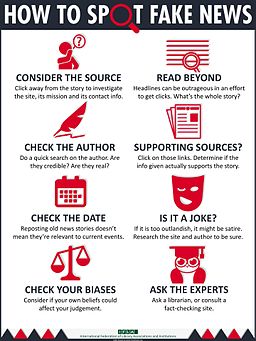Evaluating Sources: Introduction
-
Evaluating Sources: IntroductionEvaluating sources means recognizing whether the information you read and include in your research is credible. Despite the large amount of information available, both in print and online, not all of it is valid, useful, or accurate. Evaluating sources of information that you might include in your writing is an important step in any research process. When writing research papers, not only will you be searching for information, but you will be evaluating the sources for credibility. You have to decide where to look, how to recognize credible sources, and how to cross-check your information. Learning how to evaluate effectively is a skill you need both for your course papers and for your life.
Evaluating Sources - Considerations
Authorship
What authority does the author speak from?
- Biographical information, including position and experience
- Institutional affiliation
- Education and how the author is regarded in their field of study
Accuracy
What gives this information validation?
- How the data is organized
- Research methods used to gather and interpret the information
- Methodology appropriate for the topic
- Can the study be duplicated
- Sources are noted and retrievable
Point of View or Bias
Check the URL to determine if the organization has a stake in the issue at hand.
- If the information is from a corporation it will be presented in a positive light
- Products produced or sold will be for advertisement
- Political website determine if the information is from the opposition, etc.
- Internet, due to its structure self publication is easy, allowing for a vast variety of points of views
Knowledge of the Literature
This helps to evaluate the author's scholarship or knowledge of trends in their area of study.
- Bibliography
- Information makes sense
- Author discusses values or limitations of research
Currency
How timely is the information?
- Date of publication, authorship or historical record
- Library databases include subject headings, abstracts and index permanent and reliable information
- Web information needs to be vetted
- Possible investigative sources:
- Pay for Placement from Search enginewatch.com for top space advertisement sellers
- Search Engine Showdown check the frequency of search engine is updates and how it finds information written by Greg R. Notes.
Publishing Body
Is this information screened through peer review?
- Document part of an official academic or scholarly web site
- If the website seems questionable
- Check the URL and if this organization is not recognized in your field of study
- Identify the server with dnslookup and whois,
- If it resides in an individuals' personal internet account (which should be approached with great caution) through Understanding and Decoding URLs
(2016, November) Evaluating Information from Johns Hopkins University's research tools. Retrieved from http://guides.library.jhu.edu/c.php?g=202581&p=1334914
Evaluating Resources
- Evaluating Web Content
A guide to judging the reliability of web information, including blogs and social media sites. From SUNY/Albany.
[Libncsu]. (2015, June 9). Evaluating Sources for Credibility [Video File]. Retrieved from https://youtu.be/PLTOVoHbH5c
Evaluate sources, "Is it too good to be true?"
All information, whether in print or by byte, needs to be evaluated by readers for authority, appropriateness, and other personal criteria for value. If you find information that is "too good to be true", it probably is. Never use information that you cannot verify. Establishing and learning criteria to filter information you find on the Internet is a good beginning for becoming a critical consumer of information in all forms. "Cast a cold eye" (as Yeats wrote) on everything you read. Question it. Look for other sources that can authenticate or corroborate what you find. Learn to be skeptical and then learn to trust your instincts.
— from Evaluating Information from Johns Hopkins University's research tools.
(2016, November) Evaluating Information from Johns Hopkins University's research tools. Retrieved from http://guides.library.jhu.edu/c.php?g=202581&p=1334914

